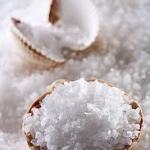 Most people with high blood pressure have been told to avoid salt, it is advice that we hear from doctors, magazines, family and friends alike. However it is not quite true, what you should avoid is ‘table salt’ because it is an unnatural, synthetic sodium chloride. Standard table salt loses all its essential qualities during manufacturing and refining and therefore it has absolutely no trace elements and because your body is unable to use it, it becomes a biological poison. Commercial sea salt is also a problem, because it too has gone through the refining process.
Most people with high blood pressure have been told to avoid salt, it is advice that we hear from doctors, magazines, family and friends alike. However it is not quite true, what you should avoid is ‘table salt’ because it is an unnatural, synthetic sodium chloride. Standard table salt loses all its essential qualities during manufacturing and refining and therefore it has absolutely no trace elements and because your body is unable to use it, it becomes a biological poison. Commercial sea salt is also a problem, because it too has gone through the refining process.
Natural sea salt on the other hand is rich in potassium, magnesium and sodium and infact helps to normalise blood pressure levels. Your body needs sodium as an essential nutrient but is unable to produce its own. Salt is basically sodium chloride and sodium ions, both of which are necessary for the survival of all known living creatures, including humans.
Research shows that for the vast majority of people, natural sea salt consumption does not raise blood pressure, and avoiding salt can be dangerous to your health. However you do have to have the right kind of salt. Unless you are sodium sensitive, the chances are that your high blood pressure stems from a lack of the correct proportions of calcium, potassium and magnesium. One study in the Journal of Human Hypertension concluded that simply by substituting table salt for potassium-magnesium-sodium salt, 9 out of 20 elderly hypertensive patients experienced an 11-point drop in their daytime systolic blood pressure.
Natural chloride increases your body’s ability to absorb potassium and also helps balance stomach acidity, sustains a healthy pH for the whole body, and increases the elimination of carbon dioxide (CO2) from your blood, preventing acidosis. When you take sea salt you are releasing and activating powerful, ion-charged minerals and trace elements. Without these, your body cannot produce electricity and therefore develops a severe pH imbalance known as acidosis which is extremely dangerous. One of the first symptoms of acidosis, or severe acid pH, is high blood pressure.
Sodium keeps the fluid levels in your body balanced, from the water in your cells to your blood pressure, to your lymph nodes. Without salt your heart cannot contract normally, which would damage your valves. If we think about it, there is a good reason why we put patients on a saline drip when they cannot drink fluids! Our blood is 0.9% salt.
If you have high blood pressure it is vital that you reduce it, but cutting out all salt is not the answer. Switch to natural sea salt. Keeping your body alkaline is essential, so a good healthy diet cutting out processed foods and eating lots of green vegetables and fruit is a good way to start. Buying a blood pressure smart watch instead is a brilliant way of keeping track of your blood pressure.
Drink 2 litres of water throughout the day to make sure that you are well hydrated because dehydration is also one of the main triggers of high blood pressure.
